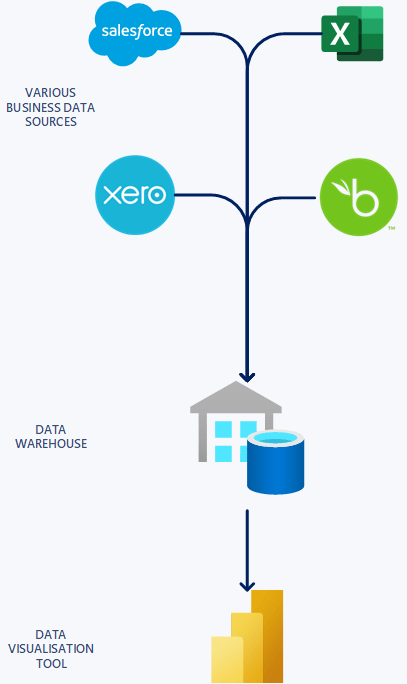Having a robust data warehousing solution is crucial for managing and analysing vast amounts of information from disparate source systems. Our Data Warehousing Consultancy services provide the expertise needed to design, implement, and optimise data warehouses tailored to your business requirements. By centralising and organising your data into a single source of truth, we enhance your ability to make informed decisions, improve operational efficiency, and gain a competitive edge. Trust us to help you harness the full potential of your data and transform it into valuable insights for sustained growth.
Data warehousing is the process of collecting, storing, and managing large volumes of data from various sources in a central repository. This repository, known as a data warehouse, is designed to facilitate efficient querying, reporting, and analysis. Data warehouses integrate data from multiple sources, ensuring consistency and accuracy, and provide a unified view of an organisation’s information.
Single Source of Truth: A data warehouse consolidates data from disparate sources, providing a single, consistent view of the organisation’s data. This eliminates discrepancies and ensures all users are working with the same information.
Improved Decision-Making: By organising and structuring data in a way that is easily accessible and understandable, data warehousing enables quick and informed decision-making. Users can run complex queries and generate reports that provide valuable insights.
Enhanced Data Quality: Data warehousing involves cleansing and transforming data, improving its quality and reliability. This ensures that decisions are based on accurate and up-to-date information.
Increased Efficiency: Centralising data in a single repository reduces the time and effort required to retrieve information from multiple sources. This streamlines reporting and analysis processes, saving time and resources.
Scalability: Data warehouses are designed to handle large volumes of data, making it easier to scale as the organisation grows. They can accommodate increasing amounts of data without sacrificing performance.
Historical Insights: Data warehouses store historical data, allowing businesses to analyse trends over time. This can be invaluable for forecasting, trend analysis, and strategic planning.

We design and architect data warehouses tailored to your business needs, ensuring optimal performance, scalability, and data integrity. Our solutions are built to support your current requirements and future growth.
Our experts streamline the process of integrating data from multiple sources into your data warehouse. We employ robust ETL methodologies to ensure data is accurately extracted, transformed, and loaded, maintaining high data quality and consistency.
We provide expertise in designing and implementing cloud-based data warehouses using platforms like Microsoft Fabric, Azure SQL and Azure Synapse. Cloud solutions offer flexibility, scalability, and cost-efficiency.
Our consultancy services include performance tuning and optimisation of your data warehouse to ensure fast query responses and efficient data processing.
While both databases and data warehouses store data, they serve different purposes. A database is used for day-to-day operations and transactional processing, whereas a data warehouse is designed for querying and analysing large datasets, often for strategic decision-making.
A data warehouse provides a centralised, organised, and high-quality data repository, enabling quick and informed decision-making. Users can run complex queries and generate reports that provide valuable insights into business operations and trends.
A traditional data warehouse is hosted on-premises within an organisation’s data center, while a cloud data warehouse is hosted on cloud platforms like Microsoft Azure and Microsoft Fabric. Cloud data warehouses offer advantages such as scalability, flexibility, and cost-efficiency.
The implementation time varies depending on the complexity and size of the project. It can range from a few months to over a year. Key factors include the scope of the project, data sources, data volume, and specific business requirements.
Yes, existing data from legacy systems can be migrated to a new data warehouse. The process involves careful planning, data mapping, and transformation to ensure data integrity and minimal disruption to business operations.
A data warehouse stores structured data optimised for querying and analysis, whereas a data lake stores raw, unstructured data that can be used for various purposes, including data science and machine learning. Data warehouses are ideal for structured data and historical analysis, while data lakes offer flexibility for handling diverse data types and formats.
For more information on the differences between the two, take a look at this comparison from Microsoft.
Easy Insight has experts that have worked on well over one hundred data warehousing projects in total. Our team of experienced professionals uses the latest technologies and best practices to ensure your data is secure, accurate, and readily accessible to meet your business reporting requirements.
We focus on developing a bespoke data warehouse solution tailored to meet all your business requirements. Our solutions are fully scalable to adapt to new business needs as they arise. Upon completion, we offer ongoing maintenance, or we can train your existing team and/or recruit the right candidate to manage it on your behalf. Ask about our training and recruitment services when you get in touch.
Contact us today to explore how we can assist you with your data warehousing requirements with our Data Warehousing Consultancy Services.
We use cookies to enhance your browsing experience, analyse site traffic, and personalise content. By clicking "Accept All," you consent to our use of cookies. You may click "Preferences" to choose which cookies you allow or "Only Essential" to use only necessary cookies. For more information, please see our Privacy Policy.